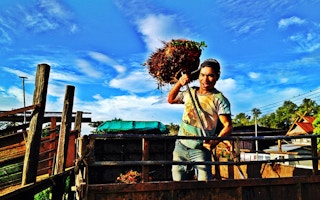Two of Australia’s biggest retailers have been misleading customers with claims that palm oil used in their own-brand products has been certified by the world’s largest association for ethical production of the commodity, an NGO has alleged.
According to Australia-based Palm Oil Investigations, retailers Woolworths and Coles are bypassing standards set by the Roundtable on Sustainable Palm Oil (RSPO) that would allow them to describe products containing the ingredient as sustainable.
The allegations come in stark contrast to the reputations of the brands, which are widely seen as leading forces for reform in an industry marred by widespread allegations of environmental and human rights violations as it has rapidly expanded in countries such as Indonesia and Malaysia.
Both retailers were awarded full marks this year on the World Wildlife Fund’s Palm Oil Buyers Scorecard, which ranks companies on how responsibly they source palm oil – an ingredient said to be included in some 50 per cent of consumer goods.
Their reputations have been built largely on their commitment to selling only own-brand products certified by the RSPO, which are supposed to be free of any link to practices forbidden by the body, such as the clearance of primary forests and deep peatlands, land grabbing and labor abuses.
In its most recent progress report, Coles says that since 2015 all of its own-brand food and drink products have contained RSPO-certified palm oil.
“
These supermarkets can point to the link to certified palm oil but since the chain of certification does not extend all the way to the product they are buying it is highly questionable and possibly illegal for them to make any claims at all that the products contain ‘certified sustainable palm oil’.
Lorinda Jane, founder, Palm Oil Investigations
Woolworths, meanwhile, says it is striving to use only RSPO-certified palm oil in own-brand products by 2020, while on its website the retailer claims to already be sourcing “100 per cent RSPO certified Own Brand products.”
However, POI says that there is little to back up the retailers’ public commitments to sustainability.
According to POI founder Lorinda Jane, both Coles and Woolworths – who use contracted manufacturers for the majority of their own-brand products – do not require all elements of the supply chain to be certified, and are bypassing official RSPO-approved audits, instead self auditing or using auditors not approved by the body.
“There is no chain of custody to back up these claims,” said Jane.
“These supermarkets can point to the link to certified palm oil but since the chain of certification does not extend all the way to the product they are buying it is highly questionable and possibly illegal for them to make any claims at all that the products contain ‘certified sustainable palm oil’,” she added.
Jane also noted that it is common for RSPO certificates to be shared and sold across a supply chain, allowing manufacturers to claim ownership of certificates that weren’t awarded to them.
It’s “a bit like claiming to be a qualified teacher because your mom was. To us this is not good enough,” she said.
The RSPO Rules on Market Communications and Claims details the criteria members need to meet before describing their products as having been certified by the body.
The rules state that members “must not make any statement that may lead consumers to believe that RSPO membership by itself implies the selling of RSPO certified oil palm products,” and must not “mislead consumers or other stakeholders as to the certified content of oil palm products.”
It is also noted that, regardless of whether the RSPO itself is referenced, sustainability claims must be “accurate” and “verifiable.”
While neither Coles nor Woolworths answered specific questions, both retailers dismissed allegations that they were making false claims of certification, and insisted in a general way that they were complying with RSPO rules.
In a statement to Mongabay, a Coles spokesperson said the retailer was “very pleased to confirm that all palm oil used in Coles Brand food and drink products is 100 per cent Certified Sustainable Palm Oil.”
A Woolworths spokesperson said palm oil used in own-brand products “is certified sustainable under RSPO’s certification requirements,” adding that a third-party audit had been carried out by Deloitte, which confirmed the claims of certification.
However, POI noted that Deloitte is not listed by the RSPO as an approved auditor.
Jane of POI said the failure of Woolworths – a member of the RSPO’s complaints panel – to meet standards highlighted failures within the body itself.
“If their complaints panel comprises any company or person that can bypass RSPO certification standards and know they are doing it, then what example is that setting for others? It’s just another fine example of a broken system,” she said.
She added that it is the responsibility of the RSPO to better monitor claims being made by its members.
“It’s not that hard. We do it. Consumers do it. But the RSPO fail to do it and currently rely on others, be it consumers or POI, to bring it to their attention.”
This story was published with permission from Mongabay.com. Read the full story.

















